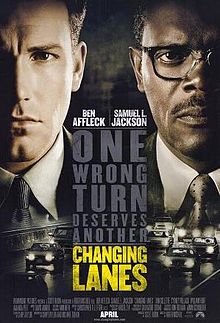Movie Review: CHANGING LANES (2002)

Changing Lanes (2002)–***
No matter how minor, a car accident always adds a little stress to your life. There’s the immediate adrenaline rush, the nervous exchange of insurance information, and the expected monetary headaches, but the tension usually subsides. In that respect, Changing Lanes is a lot like a car accident.
In Changing Lanes, Ben Affleck and Samuel L. Jackson’s simple fender bender turns into a pile-up of moral and ethical conflicts and sets the pace for a tense, but ultimately deflated thriller.
Gavin Banek (Ben Affleck) is a young, ambitious Wall Street lawyer. When his boss (and father-in-law) entrusts him to present a critical file to the court, Gavin doesn’t hesitate. He gets in his posh car and speeds to the courthouse.
Headed to the same place is Doyle Gibson (Samuel L. Jackson), a recovering alcoholic and struggling father. At the courthouse, his wife is set to claim full custody of their children, but Doyle is confident his plan for a new life as a family will change her mind. When Doyle is run off the road by the rushed Gavin, Doyle’s car is paralyzed. Gavin, determined to make his appointment, leaves Doyle at the side of the road, but he also leaves the file.
Doyle, with file in hand, shows up at the courthouse just in time to see his wife get full custody of their children. On the other side of the building, the judge gives Gavin is given until the end of the day to find the crucial file. Gavin’s hit-and-run comes hurling back at him because Doyle isn’t giving the file up without a fight. And boy is it going to be nasty one.
At first glance, Changing Lanes seems like it’s just that long coming road-rage movie. True, road-rage will probably become the focus of an action/thriller for some TBS Original, butChanging Lanes isn’t even a start for the hot topic. Instead, the little car accident in Lanes is used to transform the film’s considerable moral dilemmas into high stakes game of tug-o-war.
Leading the charge in the back and fourth battling is Samuel L. Jackson. Jackson is spectacular as the desperate father being pushed closer and closer to the edge. His performance is extremely emotional, totally hot-wired, and, most importantly, human. Divorce and alcoholism are two of the simplest ways to develop a character, but Jackson is too powerful in the role to notice.
In contrast to Jackson’s affecting performance, Ben Affleck is oddly impassive in what looks to be a very emotional role. Affleck played a much better young urban professional trying to set things right in Bounce (where, oddly, he was the alcoholic), but his performance in Lanes is solid enough to depict the stronger of the two characters.
Affleck’s character faces the real moral and ethical struggles. In an ironic twist, it’s often immorality that pushes his character. His mistress, played marvelously by Toni Collette, is the voice of sanity while his wife encourages his indiscretions. Blackmail also turns out to be a solution to his problems. Even if Affleck doesn’t necessarily give a breathtaking performance like Jackson’s, the character is too amazing and complex to disappoint.
In the end, the constant tug-o-war between the unexpectedly bitter enemies just evaporates. It’s as if both let go of the rope hoping to give the other an empty win, but the rope just falls limp. I’m sure I would be more annoyed by its predictability if this film ended with a bang, but the cheerfully quiet ending just doesn’t fully utilize the massive buildup of tension. While some additional jerking around could have been done, the climax turns out to be a safe, but pleasant stop for Changing Lanes.










